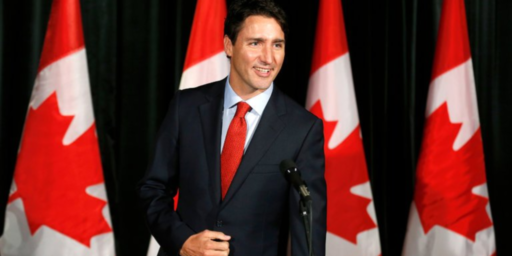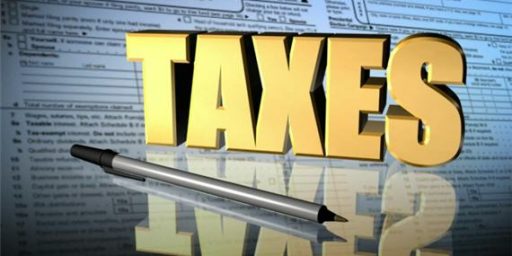Is the Bush Administration Getting a Breather from the Washington Post?
Last July, when congress was overhauling export tax laws to comply with the World Trade Organization, the Washington Post spotlighted General Electric’s political influence. According to the damning article, the multinational conglomerate was lobbying harder than ever to maximize the favorability of new rules:
The lobbying battle began in earnest soon after the WTO declared the U.S. international tax regimen illegal. The international trade enforcement organization said the laws unfairly subsidized American exports and had to be repealed to conform with trade accords. Many exporting companies saw the ruling as a disaster, but GE, one of the most experienced and successful firms in the rough-and-tumble world of tax legislation, viewed it as a chance to revise the tax code to its liking, its Washington representatives said.
Since the Tax Reform Act of 1986, GE tax lobbyists have hunted for an opening to insert into law two new statutes. The first would simplify the way companies could use the taxes they paid overseas to reduce their U.S. tax bill. The second would allow companies to defer indefinitely paying taxes on their overseas leasing businesses, especially the profits from the leasing of commercial aircraft, a business in which GE is a world leader.
If written in the way the company desires, the provisions would add many millions of dollars to its bottom line. So GE, the nation’s fifth-largest company with $134 billion in annual revenue and the largest by stock market value, put its substantial resources into action. It is one of the biggest players in the Washington campaign-contribution game and commands the most high-powered tax-lobbying team fielded by any corporate interest.
The result: GE is poised to win one and possibly both of its druthers and will benefit from many other provisions in the massive legislation.[…]
Given this history, one would have expected the Post to be all over GE’s latest earnings report, which revealed an 18% profit spike. It only published an Associated Press dispatch, though. Yet, as the Financial Times reports, there seems to be a connection between the earnings and the taxes:
Tax Breaks Help Lift GE Profits by 18%
General Electric, the world’s biggest company by market value, reported an 18 per cent jump in net earnings on Friday thanks, in part, to a sharp fall in its expected tax bill.
A series of legal changes and court victories has left GE with one of the lowest tax rates in corporate America.
The latest reductions underscore the growing struggle to tax multinational corporations at the 30-35 per cent rates demanded by many developed countries.
For the fourth quarter of 2004, GE made a total provision of $677m (£362m) for income taxes, or 11.2 per cent of its $6.06bn pre-tax earnings. Tax rates for GE’s highly profitable financial services business, reported separately, fell to just 3 per cent.
Some of the reduction relates to the sale of GE’s outsourcing business in India, which produced a gain of $336m in what is a relatively low-tax jurisdiction.
However, some of the remaining reduction relates to a $137bn package of tax breaks passed by Congress in October as part of the American Jobs Creation Act.
Although much of the legislation does not come into force until this month, GE said it was already benefiting from changes to tax rules for its aircraft-leasing business.
GE lobbied successfully in Washington during the drafting of the legislation to “simplify†certain aspects of the corporate tax code after a World Trade Organisation decision to block export tax credits.
Nevertheless, the effective tax rates revealed in Friday’s earnings announcement are far lower than many Wall Street analysts expected. Jeffrey Sprague, an analyst at Citigroup, said GE’s tax rate may “raise some eyebrowsâ€. “We are not sure yet what is behind this,†he added. GE said the main reason its tax rate continues to fall overall is that a growing share of its profits come from overseas activities, often in low-tax jurisdictions.
The effective tax rate for GE’s industrial business, excluding finance, has also fallen to just 16.7 per cent, although the company expects this to climb back to about 25 per cent this year.
Even this compares favourably with rivals such as United Technologies Corporation, which on Friday reported an 11 per cent rise in fourth-quarter earnings. UTC, which sells Pratt & Whitney jet engines, Carrier air conditioning and Otis elevators, said it expected to pay $275m on $985m of pre-tax earnings 28 per cent.
The Bush administration should be thankful that this story is buried in the British press. Otherwise, it could be answering some uncomfortable questions about tax policies and outsourcing just as it launches a post-inauguration push for Social Security privatization. Of course, any discussion of business growth is incomplete without mentioning related issues such as job creation. But it would undoubtedly be less than ideal to confront accusations of corporate welfare while rivals shoot down an ambitious domestic agenda for disproportionately benefiting Wall Street.






If you think that’s scary, you need to read this article and watch the Cspan program.
GE learned it’s lesson about globalization when the EU denied it the right to merge with Honeywell.
It’s a good program to watch.